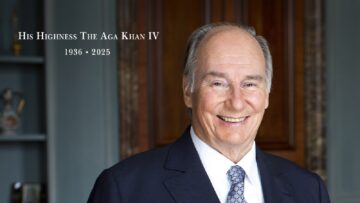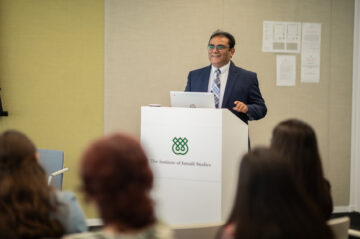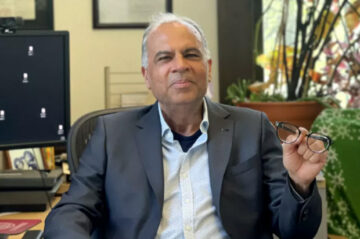Though the notion of the knowledge society can be traced back to the 1960s, it is in the last decade that it has become a forceful idea in academic, business and political circles.
The Baconian aphorism, ‘Knowledge is Power’, has in today’s context acquired a new life, albeit with a significantly different meaning. Organised by the Aga Khan Education Board for UK, the Knowledge Symposium was held at the Ismaili Centre in London on 8 March 2008. Attended by over 250 people, the event highlighted the trajectory of a society’s progress towards a knowledge-based society. Previously, similar events were also held in Canada.
The two speakers, Mr. Firoz Rasul, President of the Aga Khan University, and Professor Azim Nanji, Director of the IIS, spoke to the audience about the concept of knowledge, which now constitutes a society’s most precious resource.
As His Highness the Aga Khan said at the AKU Convocation 2006,
“Many observers describe this new world as the ‘Knowledge Society’ – contrasting it with the Industrial Societies or the Agricultural Societies of the past. In this new era, the predominant source of influence will stem from information, intelligence and insight rather than physical power or natural resources.”
President Firoz Rasul spoke about the evolving nature of knowledge and stressed the need to have a moral compass to best use the information available to us. He said that an ideal knowledge society should be characterised by intellectual wealth, risk-taking, meritocracy, pluralism and value for human resources. He noted that a key element in the knowledge society is its constant and deliberately disruptive mood, as knowledge at the frontier by its very nature challenges the society to re-evaluate what it takes for granted. It is this power of knowledge that in turn demands wisdom in its application.
Taking forward the link between knowledge and ethics, Professor Nanji stressed the role of moral premises and ethical jurisdiction in the creation and application of knowledge. He used the metaphor of the char-bagh, with its four water channels, as an analogy for the nature of a knowledge society. In terms of knowledge, the four dimensions represent the formal aspect of knowledge (legislature or guidance), the nurturing of knowledge (places of learning), the value of knowledge (ethics), and the transition of knowledge into wisdom.
He expressed the hope that contemplation of these concepts would result in a better understanding of the many layers of knowledge. Both speakers also drew upon the work of the AKDNThe Aga Khan Development Network (AKDN) is a contemporary endeavour of the Ismaili Imamat to realise the ethics and social conscience of Islam through institutional action. More to illustrate how the concept of knowledge society was being increasingly integrated into its thought processes and projects to help people around the world. For the speakers, this provided a valuable example of the transformative and ethical utilisation of the new sources of knowledge. The talks were followed by a lively question and answer session which stretched various ideas explored in the presentations.
During the informal conversation, one speaker pointed out that in recent years there has been an effort to rethink the relationship between science and religion, ethics and technology, and theology and philosophy.
The establishment of awards such as the Templeton Prize has encouraged research at the cutting edge of knowledge frontiers. Several participants commented that they found the session an inspiring introduction to several new ideas and gave insights into the contemporary world.






